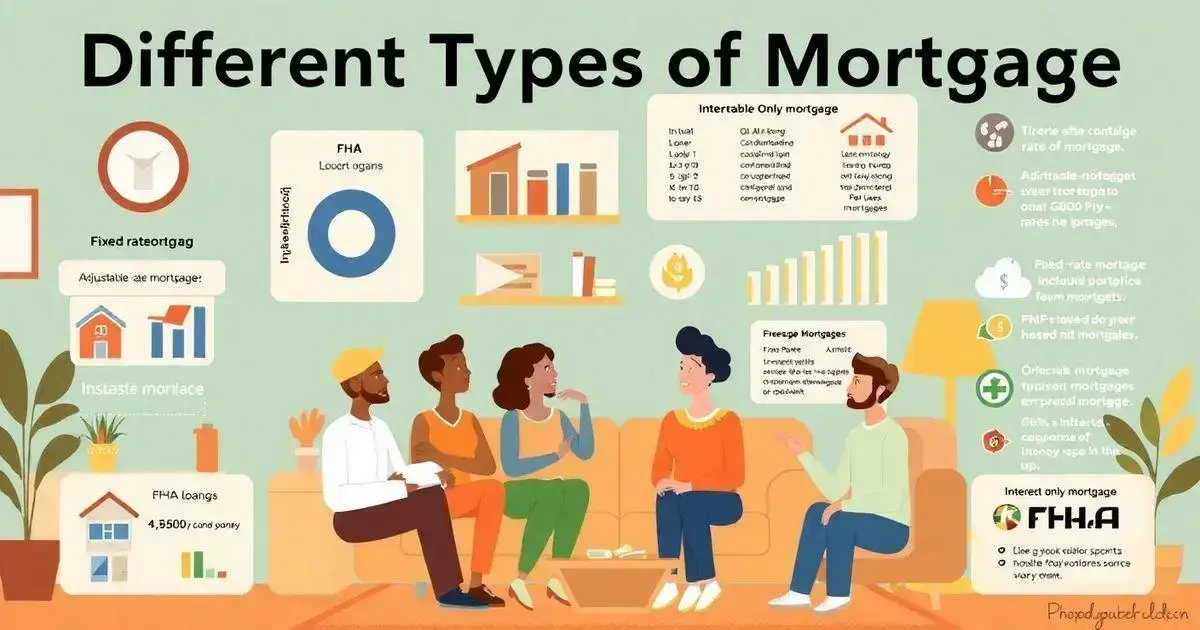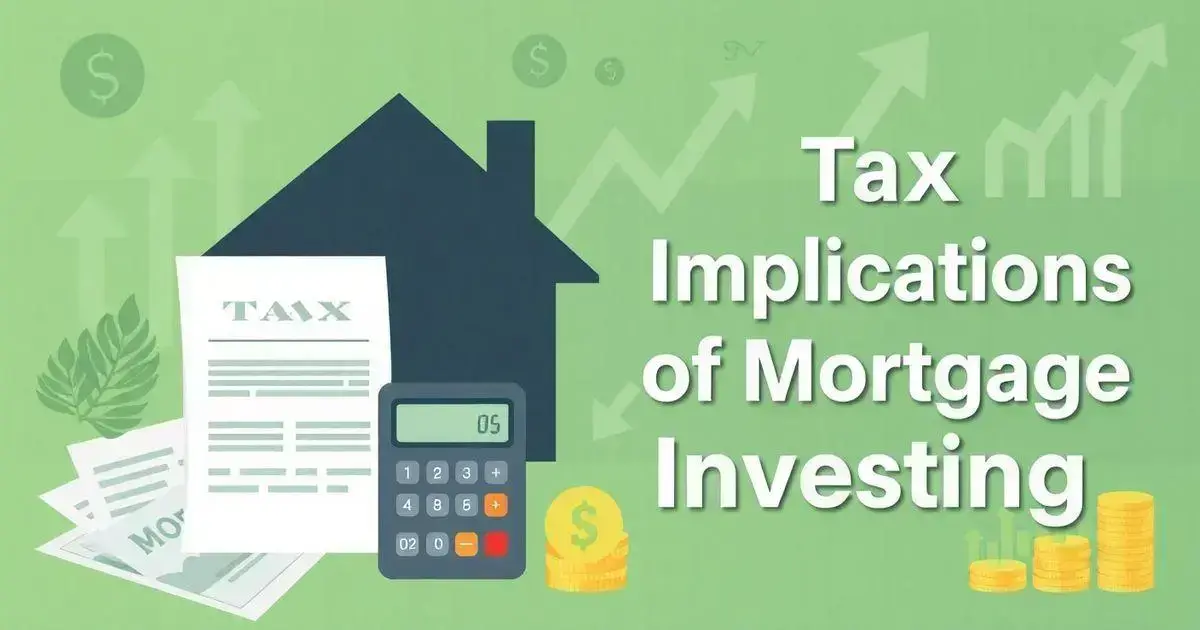How to invest in mortgages is a common question for those looking to dive into real estate investing. This type of investment can provide a steady income stream and long-term gains, but like any investment, it comes with risks that need to be carefully understood.
Investing in mortgages offers the opportunity to benefit from consistent monthly payments, as well as potential property appreciation, making it a great way to diversify your portfolio.
If you’re ready to learn the best strategies for investing in mortgages and maximizing your returns, keep reading!
Understanding Mortgages: The Basics
Understanding mortgages is crucial for anyone interested in real estate investment. A mortgage is a loan specifically to purchase property, where the property itself serves as collateral.
When you take a mortgage, the bank or lender provides you with funds to buy a home or investment property, and you agree to pay back the loan over a set period, usually 15 to 30 years.
There are different types of mortgages, including fixed-rate mortgages, where the interest rate remains constant throughout the loan’s term, and adjustable-rate mortgages (ARMs), where the rate can change periodically based on market conditions. Knowing these differences helps you make informed decisions on which type suits your financial situation.
If you’re wondering how to invest in mortgages, it’s important to consider how these loan structures impact potential returns. Lenders will evaluate your credit history, income level, and debt-to-income ratio to determine your eligibility and interest rates. A strong credit score typically leads to better loan terms and lower rates.
Additionally, it’s essential to consider the down payment required for securing a mortgage. Most conventional loans require a down payment between 3% and 20%. A larger down payment can lead to lower monthly payments and possibly eliminate the need for private mortgage insurance (PMI).
Finally, understanding mortgages also involves being aware of associated costs, such as closing costs, which can include fees for appraisals, inspections, and title searches. It’s vital to calculate these expenses when budgeting for your property purchase, especially when learning how to invest in mortgages.
Different Types of Mortgages

When investing in real estate, understanding the different types of mortgages is essential. Each type has unique features that can affect your investment strategy. There are primarily two types of mortgages: fixed-rate and adjustable-rate.
The fixed-rate mortgage offers a stable interest rate throughout the loan period. This predictability means your monthly payments remain the same, making it easier to budget over time. It’s typically favored by homebuyers who plan to stay in their homes for a long time.
On the other hand, the adjustable-rate mortgage (ARM) has a variable interest rate. Initially, it may start lower than a fixed-rate mortgage, but it can fluctuate based on the market after a specific period.
This option may benefit investors looking for lower payments at the beginning but can be risky if rates rise sharply in the future. If you’re wondering how to invest in mortgages, understanding the pros and cons of these options will help you make more informed decisions.
Moreover, there are specialized options such as interest-only loans or FHA loans that cater to various financial needs. Knowing these types helps you choose the right mortgage for your investment goals. Understanding the nuances and terms associated with each can lead to better financial decisions when learning how to invest in mortgages.
Pros and Cons of Investing in Mortgages
Investing in mortgages can offer both advantages and disadvantages. Understanding the pros and cons can help you make informed decisions on how to invest in mortgages.
Pros:
1. Steady Income: Mortgages can provide a consistent cash flow through monthly payments. This source of income can be predictable, making it an appealing option for investors.
2. Property Appreciation: Over time, real estate generally increases in value. As property values rise, so does the potential return on your investment.
3. Diversification: Investing in mortgages adds variety to your portfolio. This diversification can reduce risks associated with other investment types.
Cons:
1. Market Risks: Changes in the housing market can negatively affect property values, leading to potential losses.
2. Management Troubles: Handling mortgage investments may require time and effort, including dealing with collections or managing property.
3. Interest Rate Fluctuations: If you have an adjustable-rate mortgage, changing interest rates can increase your payment amounts, impacting your cash flow. Understanding how to invest in mortgages and manage these fluctuations is key to maintaining profitability.
How to Analyze Mortgage Investments

Analyzing mortgage investments is a vital step for ensuring success in real estate investing. Understanding how to invest in mortgages effectively is essential for maximizing returns. Here are key components to consider:
1. Cash Flow Analysis: Determine the expected cash flow from the mortgage. This includes monthly payments made by the borrower. A strong cash flow is crucial for covering costs and generating profit.
2. Market Trends: Research local market trends. Look into property appreciation rates and rental demand in the area. Understanding these factors can inform your investment decisions.
3. Risk Assessment: Evaluate the risks associated with the mortgage. Consider the borrower’s creditworthiness and the likelihood of default. This analysis helps you mitigate potential losses.
4. Comparable Sales: Compare similar properties in the area to gauge fair value. Analyzing comparable sales helps you identify if the investment is priced correctly.
5. Loan Terms: Pay attention to the terms of the loan, including interest rates and duration. Better loan terms can lead to improved cash flow and overall returns.
By focusing on these aspects, you can make informed decisions on how to invest in mortgages and enhance your real estate strategy.
Financing Options for Mortgage Investments
When exploring financing options for mortgage investments, several choices are available. It’s essential to understand these options to find the best fit for your financial goals, especially when considering how to invest in mortgages.
1. Conventional Loans: These are traditional loans offered by banks and lenders. They often require good credit and a higher down payment. However, they can offer lower interest rates for qualified buyers.
2. FHA Loans: Backed by the Federal Housing Administration, FHA loans are designed to help lower-income borrowers. They require a lower down payment and credit score, making homeownership more accessible.
3. VA Loans: If you’re a veteran or active military member, you may qualify for VA loans. These loans require no down payment and have competitive interest rates, helping veterans secure homes easily.
4. Hard Money Loans: These are short-term loans from private lenders. They are based on the property’s value rather than the borrower’s credit. Hard money loans can be useful for quick purchases but often come with higher fees and interest rates.
5. Seller Financing: In some cases, the seller may offer to finance the purchase. This can be beneficial if you have difficulty securing loans through traditional means. This arrangement can create flexible terms tailored to both parties.
By understanding these financing options, you can better navigate how to invest in mortgages and make smarter investment decisions.
Tax Implications of Mortgage Investing

Investing in mortgages can have various tax implications that every investor should understand. Knowing these can help you maximize your returns and comply with tax regulations, especially when considering how to invest in mortgages effectively.
1. Mortgage Interest Deduction: For many mortgage investors, the interest paid on a mortgage can be deducted from taxable income. This is particularly beneficial for those holding rental properties, as it can reduce their overall tax burden.
2. Property Tax Deductions: Investors may also deduct property taxes paid on their mortgage properties. Keeping track of these taxes can lead to significant savings during tax season.
3. Depreciation: Real estate investors can deduct a portion of the property’s value as depreciation over time. This deduction helps offset rental income and can lead to tax benefits.
4. Capital Gains Tax: When selling a property, investors may face capital gains tax on the profit gained. Understanding how capital gains tax works is crucial for effective tax planning. If the property is held for over a year, long-term capital gains rates apply, which are generally lower.
5. 1031 Exchange: This is a strategy that allows investors to defer capital gains tax by reinvesting in similar properties. Understanding the rules of a 1031 exchange can help investors increase their investment portfolio without immediate tax implications.
Overall, a solid grasp of these tax implications helps mortgage investors navigate their financial responsibilities and optimize their investment strategies.
Risks Associated with Mortgage Investments
Investing in mortgages can present several risks that potential investors should consider carefully. These risks can impact both your financial stability and investment returns, which is why understanding how to invest in mortgages is crucial to managing these challenges.
1. Default Risk: One of the biggest risks in mortgage investing is the chance that the borrower may default on their loan. If this happens, you may lose your expected income and potentially face legal issues. Evaluating the borrower’s credit history helps reduce this risk.
2. Interest Rate Risk: Changes in interest rates can affect your investment significantly. If rates rise, the value of your existing mortgage may decrease. This can impact your overall returns, especially if you plan to sell the mortgage.
3. Market Risk: The real estate market can fluctuate. Economic downturns can lead to decreased property values and lower rental income. Understanding the market dynamics can help you anticipate these changes.
4. Liquidity Risk: Mortgages are typically less liquid than stocks or bonds. Selling a mortgage may take time, making it difficult to access funds quickly if needed.
5. Regulatory Risk: Changes in laws and regulations can impact mortgage lending practices. Staying updated on legal requirements and regulations is vital to managing this risk.
By being aware of these risks, mortgage investors can take steps to mitigate them and make more informed investment decisions, which is essential when learning how to invest in mortgages.
Tips for First-Time Mortgage Investors
For first-time mortgage investors, there are several key tips to keep in mind to help ensure a successful investment journey and to understand how to invest in mortgages effectively.
1. Understand Your Budget: Before investing, evaluate your financial situation. Determine how much you can afford for a down payment and monthly payments. A clear budget helps you avoid financial strain.
2. Research the Market: Knowledge is power. Investigate local real estate markets to understand trends, property values, and rental demand. This information will help you make informed decisions.
3. Get Pre-Approved: Obtain a pre-approval from a lender. This process shows sellers that you are a serious buyer and helps you understand your borrowing capacity.
4. Work with Professionals: Consider hiring a real estate agent familiar with mortgage investments. Their expertise can be invaluable in navigating the buying process and negotiating deals.
5. Assess the Property: Always evaluate potential investment properties thoroughly. Look for factors like location, condition, and rental potential. A good property can lead to successful long-term investments.
6. Plan for Expenses: Remember that owning property comes with additional costs like repairs, taxes, and insurance. Budgeting for these expenses ensures you can maintain cash flow.
By following these tips, first-time mortgage investors can approach their investments with confidence and clarity, knowing exactly how to invest in mortgages to maximize their success.
Resources for Further Learning on Mortgages
Utilizing various resources can significantly enhance your knowledge in mortgage investing. Online courses from platforms like Coursera and Udemy offer valuable lessons from industry professionals, making it easier to grasp complex concepts. If you want to learn how to invest in mortgages, these platforms are a great starting point.
Books such as ‘The Book on Managing Rental Properties’ by Brandon Turner and ‘Real Estate Investing for Dummies’ by Eric Tyson provide in-depth insights and practical advice for aspiring investors who want to understand how to invest in mortgages successfully.
Podcasts focusing on real estate and finance can serve as an excellent source of ongoing education, allowing you to learn from experts while on the go.
Engaging in real estate forums like BiggerPockets connects you with experienced investors, providing a platform to discuss mortgages and investment strategies.
Additionally, many communities offer local workshops or seminars on real estate investing, which provide invaluable in-person learning opportunities.
In conclusion, leveraging these resources can build a stronger foundation for successful mortgage investing.
Lembre-se de usar HTML ao invés de Markdown.
Utilize parágrafos com <p> e sempre que possível forme parágrafos para melhor legibilidade.
Se o texto estiver em outro formato, ajuste-o para esse formato.
Frequently Asked Questions about How to Invest in Mortgages
What is a mortgage?
A mortgage is a loan used to purchase property where the property itself serves as collateral. It typically involves a commitment to repay over time.
What are the different types of mortgages?
There are various types of mortgages, including fixed-rate mortgages, adjustable-rate mortgages, FHA loans, and VA loans, each with its distinct features.
What are the benefits of investing in mortgages?
Investing in mortgages can provide steady income through monthly payments, potential property appreciation, and diversification for your investment portfolio.
What risks are associated with mortgage investments?
Investors face risks such as default risk, interest rate fluctuations, market risks, and liquidity risks, which can impact returns.
How can I analyze mortgage investments?
You can analyze mortgage investments by evaluating cash flow, researching market trends, assessing risk, and comparing with similar properties.
What resources are available for learning more about mortgages?
Various resources include online courses, real estate books, podcasts, local workshops, and forums like BiggerPockets for community engagement.
